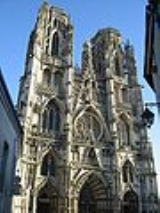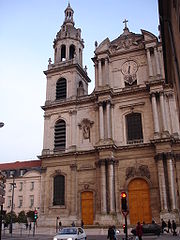
Roman Catholic Diocese of Nancy
Encyclopedia


Diocese
A diocese is the district or see under the supervision of a bishop. It is divided into parishes.An archdiocese is more significant than a diocese. An archdiocese is presided over by an archbishop whose see may have or had importance due to size or historical significance...
of the Latin Rite of the Roman Catholic church
Roman Catholic Church
The Catholic Church, also known as the Roman Catholic Church, is the world's largest Christian church, with over a billion members. Led by the Pope, it defines its mission as spreading the gospel of Jesus Christ, administering the sacraments and exercising charity...
in France
France
The French Republic , The French Republic , The French Republic , (commonly known as France , is a unitary semi-presidential republic in Western Europe with several overseas territories and islands located on other continents and in the Indian, Pacific, and Atlantic oceans. Metropolitan France...
. Erected in 1777, the diocese is currently suffragan to the Archdiocese of Besançon
The title of count
Count
A count or countess is an aristocratic nobleman in European countries. The word count came into English from the French comte, itself from Latin comes—in its accusative comitem—meaning "companion", and later "companion of the emperor, delegate of the emperor". The adjective form of the word is...
and the rights of sovereignty of the medieval Bishops of Toul originated in certain grants which Henry the Fowler gave St. Gauzelin in 927. During the Conflict of Investitures in 1108, the chapter became divided: the majority elected Riquin of Commercy as bishop; the minority chose Conrad of Schwarzenburg. Henry V
Henry V, Holy Roman Emperor
Henry V was King of Germany and Holy Roman Emperor , the fourth and last ruler of the Salian dynasty. Henry's reign coincided with the final phase of the great Investiture Controversy, which had pitted pope against emperor...
granted Conrad the title of bishop
Bishop
A bishop is an ordained or consecrated member of the Christian clergy who is generally entrusted with a position of authority and oversight. Within the Catholic Church, Eastern Orthodox, Oriental Orthodox Churches, in the Assyrian Church of the East, in the Independent Catholic Churches, and in the...
, with the stipulation that he did not exercise episcopal office.
In 1271 grave differences broke out again in the chapter of Toul
Toul
Toul is a commune in the Meurthe-et-Moselle department in north-eastern France.It is a sub-prefecture of the department.-Geography:Toul is located between Commercy and Nancy, and situated between the Moselle River and the Canal de la Marne au Rhin....
. In 1278 Pope Nicholas III
Pope Nicholas III
Pope Nicholas III , born Giovanni Gaetano Orsini, Pope from November 25, 1277 to his death in 1280, was a Roman nobleman who had served under eight Popes, been made cardinal-deacon of St...
personally appointed Conrad of Tübingen
Tübingen
Tübingen is a traditional university town in central Baden-Württemberg, Germany. It is situated south of the state capital, Stuttgart, on a ridge between the Neckar and Ammer rivers.-Geography:...
as bishop. Thereafter, it was generally the Holy See
Holy See
The Holy See is the episcopal jurisdiction of the Catholic Church in Rome, in which its Bishop is commonly known as the Pope. It is the preeminent episcopal see of the Catholic Church, forming the central government of the Church. As such, diplomatically, and in other spheres the Holy See acts and...
which appointed the bishops, alleging various reasons as vacancies arose. As a result, many Italian prelates held this important see until 1552, when Toul was occupied by France
France
The French Republic , The French Republic , The French Republic , (commonly known as France , is a unitary semi-presidential republic in Western Europe with several overseas territories and islands located on other continents and in the Indian, Pacific, and Atlantic oceans. Metropolitan France...
. In 1597 Charles III
Charles III, Duke of Lorraine
Charles III , known as the Great, was Duke of Lorraine from 1545 until his death.-History:He was the eldest surviving son of Francis I, Duke of Lorraine, and Christina of Denmark...
, duke
Duke
A duke or duchess is a member of the nobility, historically of highest rank below the monarch, and historically controlling a duchy...
of Lorraine
Lorraine (province)
The Duchy of Upper Lorraine was an historical duchy roughly corresponding with the present-day northeastern Lorraine region of France, including parts of modern Luxembourg and Germany. The main cities were Metz, Verdun, and the historic capital Nancy....
asked Pope Clement VIII
Pope Clement VIII
Pope Clement VIII , born Ippolito Aldobrandini, was Pope from 30 January 1592 to 3 March 1605.-Cardinal:...
for the dismemberment of the See of Toul and the creation of a see at Nancy; this failed through the opposition of Arnaud d'Ossat, Henry's ambassador at Rome
Rome
Rome is the capital of Italy and the country's largest and most populated city and comune, with over 2.7 million residents in . The city is located in the central-western portion of the Italian Peninsula, on the Tiber River within the Lazio region of Italy.Rome's history spans two and a half...
. In the end, Clement VIII decided that Nancy was to have a primatial church and that its prelate
Prelate
A prelate is a high-ranking member of the clergy who is an ordinary or who ranks in precedence with ordinaries. The word derives from the Latin prælatus, the past participle of præferre, which means "carry before", "be set above or over" or "prefer"; hence, a prelate is one set over others.-Related...
would have the title of Primate of Lorraine and wear episcopal insignia, but should not exercise episcopal jurisdiction.
In 1648 according to the Treaty of Westphalia the bishoprics of Metz, Toul and Verdun (all belonging to the Holy Roman Empire
Holy Roman Empire
The Holy Roman Empire was a realm that existed from 962 to 1806 in Central Europe.It was ruled by the Holy Roman Emperor. Its character changed during the Middle Ages and the Early Modern period, when the power of the emperor gradually weakened in favour of the princes...
) became French cities. The duchy of Lothringen
Lorraine (région)
Lorraine is one of the 27 régions of France. The administrative region has two cities of equal importance, Metz and Nancy. Metz is considered to be the official capital since that is where the regional parliament is situated...
, surrounded by French territories and repeatedly occupied by French troops, finally fell to the French, and Lorraine became a French province
Province
A province is a territorial unit, almost always an administrative division, within a country or state.-Etymology:The English word "province" is attested since about 1330 and derives from the 13th-century Old French "province," which itself comes from the Latin word "provincia," which referred to...
. After the French revolution
French Revolution
The French Revolution , sometimes distinguished as the 'Great French Revolution' , was a period of radical social and political upheaval in France and Europe. The absolute monarchy that had ruled France for centuries collapsed in three years...
of 1789 France was divided into departments—Lorraine consisted of the departments of Meurthe, Meuse, Moselle and Vosges. Nancy, Verdun, Metz and Epinal became the capitals of these departments.
In 1777 and 1778 Toul lost territories out of which were formed two new dioceses: Saint-Die and Nancy, both of them suffragans of Trier. The Concordat of 1802, suppressing Toul
Toul
Toul is a commune in the Meurthe-et-Moselle department in north-eastern France.It is a sub-prefecture of the department.-Geography:Toul is located between Commercy and Nancy, and situated between the Moselle River and the Canal de la Marne au Rhin....
, made Nancy the seat of a vast diocese
Diocese
A diocese is the district or see under the supervision of a bishop. It is divided into parishes.An archdiocese is more significant than a diocese. An archdiocese is presided over by an archbishop whose see may have or had importance due to size or historical significance...
which included three Departments: Meurthe, Meuse, and Vosges. Eventually the latter two were detached from Nancy on the re-establishment of the Dioceses of Verdun
Verdun
Verdun is a city in the Meuse department in Lorraine in north-eastern France. It is a sub-prefecture of the department.Verdun is the biggest city in Meuse, although the capital of the department is the slightly smaller city of Bar-le-Duc.- History :...
and Saint-Dié in 1822. Since 1824 the bishops of Nancy have borne the title of Bishops of Nancy and Toul, as the ancient Diocese of Toul
Diocese of Toul
The Diocese of Toul was a Roman Catholic diocese seated at Toul in present-day France. It existed from 365 until 1824. From 1048 until 1552 , it was also a state of the Holy Roman Empire.- History :...
is almost entirely united with Nancy.
Bishops
- 1777-1783 : Louis-Apolinaire de La Tour du Goupille-Montauban, also archbishop of Auch
- 1783-1787 : François de Fontanges, also archbishop of Bourges
- 1787-1816 : Anne Louis Henri de La Fare, also archbishop of Sens
- 1802-1823 : Antoine Eustache d'Osmond
- 1823-1844 : Charles-Auguste-Marie-Joseph de Forbin-Janson
- 1844-1859 : Alexis-Basile-Alexandre Menjaud, also archbishop of Bourges
- 1859-1863 : Georges DarboyGeorges DarboyGeorges Darboy was a French Catholic priest, later bishop of Nancy then archbishop of Paris. He was among a group of prominent hostages executed as the Paris Commune of 1871 was about to be overthrown....
, also archbishop of ParisArchbishop of ParisThe Roman Catholic Archdiocese of Paris is one of twenty-three archdioceses of the Roman Catholic Church in France. The original diocese is traditionally thought to have been created in the 3rd century by St. Denis and corresponded with the Civitas Parisiorum; it was elevated to an archdiocese on... - 1863-1867 : Charles-Martial d'Allemand-Lavigerie, also archbishop of Algiers
- 1867-1882 : Joseph-Alfred FoulonJoseph-Alfred FoulonJoseph-Alfred Foulon was a French Roman Catholic Cardinal and Archbishop of Lyon.He was born in Paris and studied in the Saint-Sulpice Seminary. He was ordained priest on December 18, 1847, in Paris, where he taught for twelve years in the minor seminary.He was elected bishop of Nancy on March 27,...
, also archbishop of Besançon - 1882-1918 : Charles-François Turinaz,
- 1918-1919 : Charles-Joseph-Eugène Ruch, also archbishop of Strasbourg
- 1919-1930 : Hippolyte-Marie de La Celle
- 1930-1934 : Etienne-Joseph HuraultEtienne-Joseph HuraultEtienne-Joseph Hurault was a French Roman Catholic bishop.He was bishop of Viviers from 1923 to 1930 and bishop of Nancy from 1930 to 1934 .-External...
- 1934-1949 : Fleury de Marcel
- 1949-1956 : Marc-Armand Lallier, also archbishop of Marseille
- 1957-1971 : Emile-Charles-Raymond Pirolley
- 1972-1991 : Jean Albert Marie Auguste Bernard
- 1991-1998 : Jean-Paul Maurice Jaeger, also bishop of Arras
- 1999–present : Jean-Louis Henri Maurice Papin

